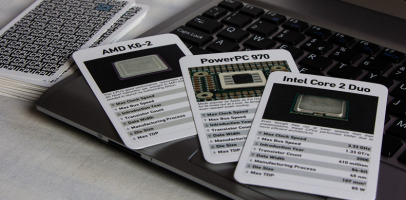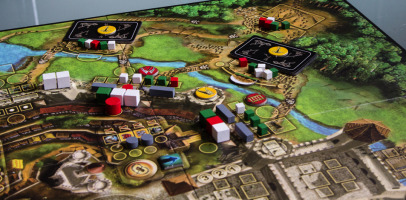What We're Playing: CPU Wars & Stronghold
December 30, 2012 | 12:34

It’s been a little while since we last spoke board games, so we thought we'd have a quick festive round up of what we've been playing over the Christmas break. We’ve got two games to show you today, and you will not want to miss this first one, we guarantee.[break]
CPU Wars - £7.99 from cpuwarsthegame.com
We’ll get the negative stuff out of the way first, because frankly, there is one really big issue with CPU Wars - we didn’t think of it. It’s glorious in its simplicity, and there seems to be a top trumps deck for just about everything these days, so why not CPUs?
Anyone who’s played a game of top trumps before will be familiar with how CPU Wars works; players compete via on card statistics, with the player who’s turn it is picking which particular stat to compare. The winner gets both the cards and the next go, and the aim of the game is to own the whole deck.

As you’d expect, the stats you’re comparing are gloriously geeky - TDP (lower is better), data width (higher is better) and transistor count (higher is better again) are all available as battlegrounds, as are other, more sedate areas, such as introduction year.
The range of CPUs on show is excellent too, and spans a full four decades, with everything from the humble Intel 8080 to the monstrous Core i7 represented. Members of the team cooed with delight when classics such as the Zilog Z80 (as seen in the ZX Spectrum) came up, and everyone wanted to win the card representing the CPU their first PC was based on.
Evidently CPU Wars isn't for everyone - it revels in its geek appeal, and this will make it inaccessible or uninteresting for some (our mum wasn't impressed, for example). Safe to say though that we love it, and for £8, it's a great addition to a LAN party and should surely be a mandatory piece of kit for every paid up geek.
Stronghold - £39.99 from maddisongames.co.uk
In direct contrast to the simplicity of CPU wars is Stronghold - a game that was described to us as 'knotty' by the supplier that was kind enough to ship a copy to us. The central premise is simple, however; one player is attacking the titular stronghold, while one is defending it. If the attacker gains entry within a certain number of turns, he is the victor, while it's the defenders job to keep him out until the clock runs down.
It's actually this black and white win condition that we found to be the most annoying aspect of the game - only one of the attacking orks, goblins or trolls needs to get a foot on the battlements for the game to end, meaning just one slip-up or lapse in judgement by the defender and it's curtains. There isn't anything wrong with brutal, cut-throat win conditions of course, but they don't exactly make for a flowing game - the defender tended to be very cautious in our games, double and triple checking calculations before passing the turn back to the attacker.

Playing the attacker is a completely different kettle of fish - you've got largely unlimited resources to play with and a menagerie of tricks and machines with which to assault the castle walls. It almost seems too easy for the attacker, until you learn of the clever little rule at the heart of Stronghold.
The attacker goes first, and for each action he makes, the defender gets an action token to spend in his go. This makes attacking a deliciously tricky balance between getting things done, but also not doing too much - you have to try and limit how much the defender can do by limiting his action tokens, but don't do too little, as there is a clock ticking.
Finally, its worth mentioning that the tools available to the attackers heavily shape the approach that they are likely to take, so it's good that these are decided randomly at the start of the game, adding each play through its own flavour.
All this makes for an interesting, if unforgiving game. If you've got a group of friends who are willing to take the time to learn the rules, you'll get your moneys worth out of it, and a few laughs too.
CPU Wars - £7.99 from cpuwarsthegame.com
We’ll get the negative stuff out of the way first, because frankly, there is one really big issue with CPU Wars - we didn’t think of it. It’s glorious in its simplicity, and there seems to be a top trumps deck for just about everything these days, so why not CPUs?
Anyone who’s played a game of top trumps before will be familiar with how CPU Wars works; players compete via on card statistics, with the player who’s turn it is picking which particular stat to compare. The winner gets both the cards and the next go, and the aim of the game is to own the whole deck.

As you’d expect, the stats you’re comparing are gloriously geeky - TDP (lower is better), data width (higher is better) and transistor count (higher is better again) are all available as battlegrounds, as are other, more sedate areas, such as introduction year.
The range of CPUs on show is excellent too, and spans a full four decades, with everything from the humble Intel 8080 to the monstrous Core i7 represented. Members of the team cooed with delight when classics such as the Zilog Z80 (as seen in the ZX Spectrum) came up, and everyone wanted to win the card representing the CPU their first PC was based on.
Evidently CPU Wars isn't for everyone - it revels in its geek appeal, and this will make it inaccessible or uninteresting for some (our mum wasn't impressed, for example). Safe to say though that we love it, and for £8, it's a great addition to a LAN party and should surely be a mandatory piece of kit for every paid up geek.
Stronghold - £39.99 from maddisongames.co.uk
In direct contrast to the simplicity of CPU wars is Stronghold - a game that was described to us as 'knotty' by the supplier that was kind enough to ship a copy to us. The central premise is simple, however; one player is attacking the titular stronghold, while one is defending it. If the attacker gains entry within a certain number of turns, he is the victor, while it's the defenders job to keep him out until the clock runs down.
It's actually this black and white win condition that we found to be the most annoying aspect of the game - only one of the attacking orks, goblins or trolls needs to get a foot on the battlements for the game to end, meaning just one slip-up or lapse in judgement by the defender and it's curtains. There isn't anything wrong with brutal, cut-throat win conditions of course, but they don't exactly make for a flowing game - the defender tended to be very cautious in our games, double and triple checking calculations before passing the turn back to the attacker.

Playing the attacker is a completely different kettle of fish - you've got largely unlimited resources to play with and a menagerie of tricks and machines with which to assault the castle walls. It almost seems too easy for the attacker, until you learn of the clever little rule at the heart of Stronghold.
The attacker goes first, and for each action he makes, the defender gets an action token to spend in his go. This makes attacking a deliciously tricky balance between getting things done, but also not doing too much - you have to try and limit how much the defender can do by limiting his action tokens, but don't do too little, as there is a clock ticking.
Finally, its worth mentioning that the tools available to the attackers heavily shape the approach that they are likely to take, so it's good that these are decided randomly at the start of the game, adding each play through its own flavour.
All this makes for an interesting, if unforgiving game. If you've got a group of friends who are willing to take the time to learn the rules, you'll get your moneys worth out of it, and a few laughs too.

MSI MPG Velox 100R Chassis Review
October 14 2021 | 15:04






Want to comment? Please log in.